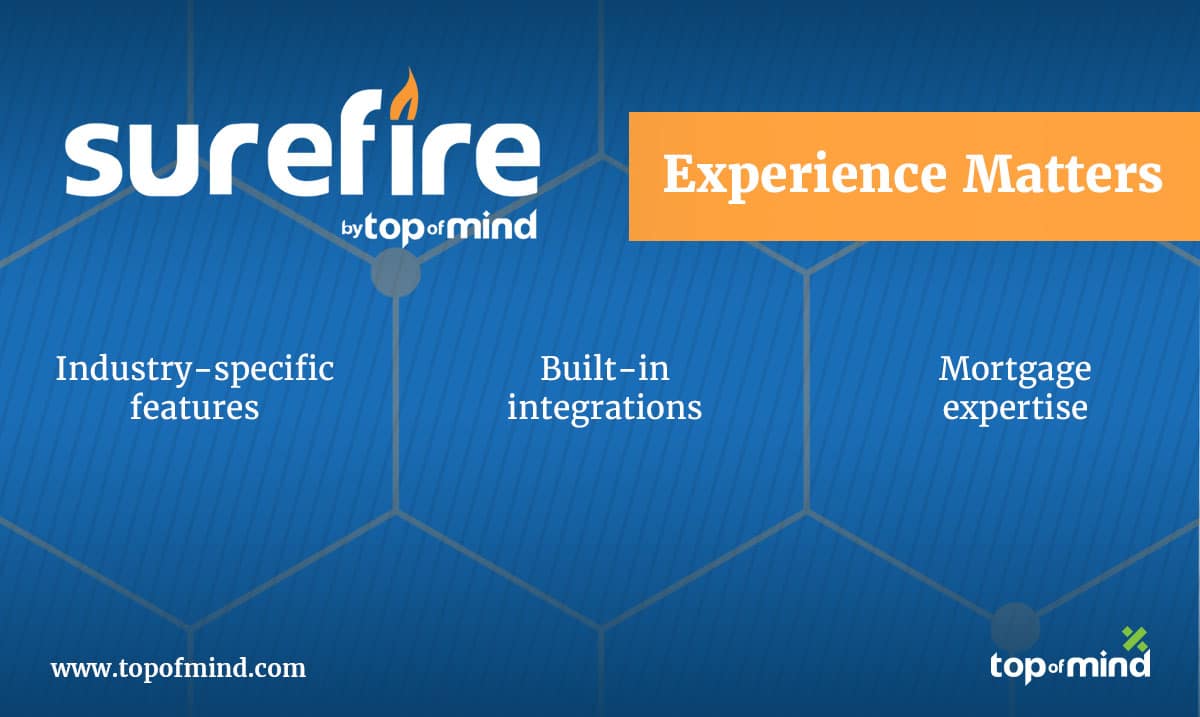After years of explosive growth, the customer relationship management (CRM) market is now the world’s single biggest software market. The overwhelming majority of American businesses that employ 10 or more people use a CRM, and mortgage lenders are no exception. But with literally hundreds of CRMs to choose from, it can be hard for mortgage companies to know where to start. When we ask our mortgage lender customers — many of whom have been with us nearly 20 years — why they continue to prefer Surefire CRM, here’s what they tell us.
Industry-specific features make implementation speedy.
GET STARTED TODAY
Give Surefire a Try!
The best way to find out what we offer is to try it out yourself. We’re confident that you’ll like what you see.
To say the mortgage industry is unique is an understatement. Buying cycles for homes are measured in years, not days or months. Strong referral partner relationships are essential. Marketing regulations are layered and complex. Product pricing changes daily (if not hourly).
Most CRMs simply aren’t built to support the specialized journey of the mortgage customer. Lenders who choose industry-agnostic solutions must plan for a lengthy implementation process and devote significant resources (whether internal or outsourced) to configuration and testing. For instance, since non-mortgage CRMs don’t natively support referral partner co-branding, this capability must be developed and bolted on. Similarly, industry-agnostic CRMs aren’t built with mortgage marketing regulations in mind. Without built-in compliance controls, lenders must establish strict internal marketing processes to limit their risk exposure.
Mortgage lenders that want to put a marketing strategy into action quickly are best served by choosing a CRM that’s purpose-built for their industry, like Surefire CRM. Built on nearly two decades of industry experience, Surefire comes with capabilities like referral partner co-branding and compliance controls baked in, allowing lenders to get up and running quickly no matter their size, structure or origination channels. Speedier deployment means a lower cost of implementation and a faster return on technology investment.
Built-in integrations drive operational efficiency.
The average mortgage business relies on a dozen or more software tools — yet nobody wants to spend their business days juggling 12 different systems. To bring order to the chaos, some users leverage their CRM as a single point of productivity (SPOP). Others prefer to tap into their CRM’s capabilities through another core system. In either case, when lenders choose CRMs that don’t “talk” to their organizations’ other technologies, they find themselves mired in duplicative processes and manual data entry.
While it’s sometimes possible to build an integration from scratch using internal resources or a “hired gun” middleware developer, most find this approach prohibitively costly and time-consuming. Instead, by choosing a CRM that integrates with their existing tech stack, lenders can work more efficiently and take advantage of their tools’ combined powers.
Surefire CRM’s integrations are the most time-tested of any mortgage CRM. Thanks to our long-term investment in the mortgage industry, we integrate seamlessly with leading loan origination systems (LOS), point-of-sale platforms (POS), product and pricing engines, video messaging services and market intelligence tools — just to name a few. And to make it easy for mortgage companies to share data between Surefire and technologies that are still on our integration roadmap, why we provide open APIs and Zapier connectivity to every client.

